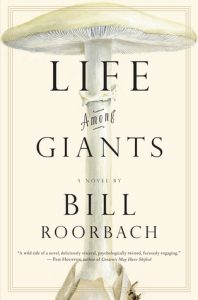 At 17, David witnesses his father’s public assassination for turning state’s witness, his mother collateral damage, his life spared due to spent ammo. He spends decades piecing together evidence to determine the killer’s identity, all while living his life as an NFL quarterback for the Dolphins, a random lover of the famous dancer Sylphide (who lives across the pond from his childhood home) and her protege Emily—introduced by him, and a restaurateur. His sister parcels out relevant information on rare occasions, spending her grief-stricken adulthood playing professional tennis, fighting mental illness, and searching for her parent’s killer against her boyfriend’s pragmatic advice. As Sylphide moves in and out of David’s life, secrets come unmoored and land at his feet every so often. Roorbach has built a fine cast of complex and extraordinary characters, nuanced to the hilt, integrity intact throughout the novel, all maddeningly non-forthcoming for page-turning tension. It can be awkward to follow the timeline back and forth, and David’s discoveries can be out of sync, as when he realizes his sister’s major secret years after his parent’s demise, and then in a following flashback is explicitly told the secret by his sister herself. No opportunity is missed to reference Emily as “the negress”—was that even used as late as the 70s and into the 80s? Her parents could have been a bit more rounded out as individuals instead of representations. These few distractions don’t detract from a unique story with an intriguing storyline and intense meta sex scenes. Roorbach is almost his own genre. He’s the Mainer Carl Hiassen in his dedication to untangling and tying up multiple storylines and presenting humans in all their glory and warts.
At 17, David witnesses his father’s public assassination for turning state’s witness, his mother collateral damage, his life spared due to spent ammo. He spends decades piecing together evidence to determine the killer’s identity, all while living his life as an NFL quarterback for the Dolphins, a random lover of the famous dancer Sylphide (who lives across the pond from his childhood home) and her protege Emily—introduced by him, and a restaurateur. His sister parcels out relevant information on rare occasions, spending her grief-stricken adulthood playing professional tennis, fighting mental illness, and searching for her parent’s killer against her boyfriend’s pragmatic advice. As Sylphide moves in and out of David’s life, secrets come unmoored and land at his feet every so often. Roorbach has built a fine cast of complex and extraordinary characters, nuanced to the hilt, integrity intact throughout the novel, all maddeningly non-forthcoming for page-turning tension. It can be awkward to follow the timeline back and forth, and David’s discoveries can be out of sync, as when he realizes his sister’s major secret years after his parent’s demise, and then in a following flashback is explicitly told the secret by his sister herself. No opportunity is missed to reference Emily as “the negress”—was that even used as late as the 70s and into the 80s? Her parents could have been a bit more rounded out as individuals instead of representations. These few distractions don’t detract from a unique story with an intriguing storyline and intense meta sex scenes. Roorbach is almost his own genre. He’s the Mainer Carl Hiassen in his dedication to untangling and tying up multiple storylines and presenting humans in all their glory and warts.
Tag Archives: relationships
Sandi Ward—women’s fiction author who writes humanity-embracing stories from the unique perspective of cats

I met Sandi on Twitter. She is super friendly and supportive of other writers. If you’re a fan of Hallmark, love heartwarming stories, and appreciate learning about other humans through reading, her novels are for you. Oh, you must also love cats! Here’s my review on her second novel Something Worth Saving.
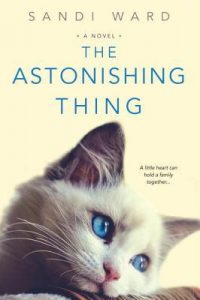 Tell me about your writing process: schedule, environment, strategies, and inspirations tangible and abstract—what’s in your office?
Tell me about your writing process: schedule, environment, strategies, and inspirations tangible and abstract—what’s in your office?
Because I work full-time (I’m a medical copywriter at an ad agency), I write my fiction sporadically, whenever I can grab a few minutes here and there. My MacBook Air is always with me, and it essentially is my office-to-go! I’ll write in the early morning, on my lunch hour, late at night, or whenever else I can grab a few minutes.
I prefer to write with a hot cup of coffee nearby. My primary requirement is quiet. I can’t write with music or other background noise going on.
I don’t outline my story arc on a line chart, or put plot points on post-it notes, or anything like that. I’m completely what some people call a “pantser,” making it up as I go along (flying by the seat of my pants). I re-read written chapters and then add a new one, going back constantly to edit in new ideas. My goal is to write stories that are unexpected, and not formulaic. I let the characters surprise me, in the hopes that they will also surprise the reader.
 Walk me through your publishing process from final draft to final product: publishing team, timeline, and expectations of you as the author, especially toward marketing and publicity.
Walk me through your publishing process from final draft to final product: publishing team, timeline, and expectations of you as the author, especially toward marketing and publicity.
Kensington gives me a year to write a novel, during which time their art department starts to design a cover and their marketing team writes potential cover copy (once I can supply a synopsis). Once the draft is done, it goes to my agent and editor, and we do a round of changes before moving on to copy editing, and finally page proofs. This stage also takes about a year, from final first draft to published book.
On the one hand, this process is slow. By the time of book launch, it has been over a year since I wrote the story. But I’m happy to be writing general fiction, where I get the time I need to devote to writing a first draft. Other writers, in genres like romance and mystery, are sometimes under pressure to write much faster, and that would be tough for me. I’m always promoting books at the same time I’m writing new stories, so I’ve got plenty to keep me busy. Right now I’m finishing up the first draft of my third novel, What Holds Us Together.
My publicists and the social media team at Kensington decide where and how to promote the book, for example via print or online advertising, but I also do as much as I can! I maintain my website and social media accounts, and reach out to other authors, readers and book bloggers who might be able to share news and reviews of the book.

Describe your support system online and IRL—who are your biggest cheerleaders?
My literary agent, Stacy Testa at Writers House, is my #1 go-to person for all of the questions I have about writing and promotion. She’s amazing and I’m very lucky to be working with her!
Other authors have also been incredibly supportive. The online writing and reading community is great about sharing information and helpful tips. I belong to a number of writing-based Facebook groups where I learn new things every day, and try to share some of my own knowledge.
At home, it helps that my husband and teens are all writers. My husband is also in advertising, my son is a journalism major in college, and my daughter is a student filmmaker. They can relate when I need to disappear into my laptop for a while.
Your unusual protagonists are cats; I suspect you’re a huge animal lover, and I’m curious how you determined to write cat main characters. How does your life influence your writing and vice versa?
I do love animals! I have both a cat and a dog.
When people ask me what inspired me to write from a cat’s point of view, the truth is, I don’t remember exactly how I got started with it. Essentially, I wanted to experiment and try writing from the viewpoint of an unconventional narrator. I love books like The Curious Incident of the Dog in the Night-time and The Boy in the Striped Pajamas, which are written from unexpected points of view, where the reader realizes that more is going on than the narrator fully understands.
A main theme that runs throughout all of my books is how hard it is to be a parent—especially of teenagers. Real life absolutely influences my characters and stories. I don’t usually talk about my personal life too much, but if you read my books, you’ll quickly figure out where I stand on many issues.
When I wrote Something Worth Saving, I was feeling pessimistic about how divisive society has become. I don’t have all the answers. I think it’s okay to disagree with others, but it’s also important to be respectful and not make anyone feel unsafe. My character Charlie (my narrator Lily’s favorite human) should not have to feel threatened when he wants to express himself—not at school, not at home, not anywhere. For me, writing a novel is a better way to try and convince someone to take another look at an issue, rather than shouting on Twitter about it.
What do you love most about your creativity?
I enjoy getting really enthusiastic about ideas, words and images. This is true at my job at the ad agency as well as when I’m writing fiction. Great ideas should get the creator fired up, and want to share those thoughts with the world. I believe you have to write for yourself first, and then you can try to get everyone else on board.
Connect with Sandi:
Flash Fiction Friday: delving into the past to fill out the rest of the year
Questions Live On
A lithe, unassuming young girl walks down her street. She sees a dirty old man who grabs at her skirt. Bastard! They never grow out of it. She sees a man giving flowers to a woman on her doorstep. Sweet, but sure it’s only surface sugar. She sees a starving artist painting picnickers in the park. He doesn’t know from angst. She sees a boy smacking his dog for disobeying. He won’t grow out of that either. She sees a military-uniformed man on a park bench, much-loved letters scrunched in his hand, staring into space. She feels no sympathy.
They are all her father. His art, his military service, not even his love for her mother, compensates for making her feel dirty, and forcing her to live in the dark end of the tunnel, at 14. Her mother was lost to her, just a woman at the other end of that tunnel who regulated her day. Feeding and clothing must equal love, or is it merely obligation? Would love allow pain to continue, and knowledge of it to slip into fog? A drowning man can’t save a drowning man. A woman in pain cannot save a girl in pain.
Look to God then. Such a small prayer over and over for lightning to strike him down. God brought him back from war. War! So much more convenient than lightning. Keep your God! My mother will not become a person, for God’s sake.
The quiet young man of 15 writes poetry for her; she refuses flowers. She wonders if he lies. He says everyone does. He lies? She wonders if he ever could be guilty of her father’s sin. This question remains unasked. He touches her face. She flinches. He cries at night for her.
He writes:
Blue skies
Blue eyes
So big they take you in
The Blond flows long
Forget the pain
Sadness dies
For you so sweet
Dreams are real
Dreams are true
Everyone lies
Not you
For you believe
That Truth one day
Will make people
Bigger than they are
Ideals die hard
Love remains
Despite experience.
Her diary reads:
Cliché — understanding or manipulation? If I did not believe that one day my life will be elsewhere, courage would fail me to continue life. Yet, I’m allergic to pain — hah!
Even the screaming, the touching, and the nonsense cannot belie the fact that I was meant for greater things. If hardship builds character, then I am indeed of great character. I just hope it’s not a cartoon character, and God is not a comedian.
Tuesday, she meets a Jewish man, who explains to her that Jesus was just a man, a great prophet, maybe, but a simple mortal nonetheless. She meditates on this for two days before belief settles in. Thursday, she meets a philosopher, who expounds upon Plato’s shades of gray. Nothing is real. It is all perception. In one afternoon, conviction of Plato’s theory solidifies in her mind. Friday, she meets an old woman who outlines men’s evils. Her father’s sin makes the list. Such a sweet young thing should not have to live in a world of such men. The old woman’s revelation brings her no comfort.
Her father comes to her Saturday. Sunday, to spite God, she steps in front of a bus. Her parents weep, but the young man grieves dry-eyed, knowing the Truth.
The Girl of the Lake by Bill Roorbach
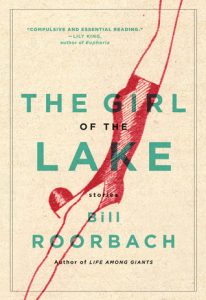 This collection opens with a tale so convincing dear reader will be googling Count Darlotsoff of the Russian Revolution. Roorbach’s stories ramble along pleasantly, with wit and wisdom, from a unique perspective. Then BOOM! Something astonishing happens, sometimes indicated by a simple line, “And fell into a basement hole,” and sometimes portraying a much larger concept, such as patricide. The tales delve into history—the aforementioned Russian Revolution; plunges deep into socio-political culture—“His father was an important king or chieftain in an area of central Africa he refused to call a country, an area upon which the Belgians and several other European powers had long imposed borders and were now instituting ‘native’ parliaments before departing per treaty after generations of brutal occupation;” and parses human emotions and relationship dynamics—“sharks unto minnows.” There’s even a ghost story, with elements of land conservation, familial squabbles, and burgeoning love. As diverse as the themes are, and as broad the representation of people, one story stands out for its LGBT ignorance, as a main character tells the benefactor of her theater, a widower asking for a kiss, “Marcia had politely allowed just one, then explained that while being a lesbian might not mean she was entirely unavailable, her long-term relationship did.” He then proceeds to win over her wife, and they merrily cavort about town, all three holding hands, doing everything as a threesome. Lesbian relationships are real relationships, and lesbians are not toys for a man’s pleasure. That being said, this is a blemish on a set of otherwise fascinating and weird and brilliant stories. The book is dedicated to Jim Harrison, whose fans will likely appreciate Roorbach’s work.
This collection opens with a tale so convincing dear reader will be googling Count Darlotsoff of the Russian Revolution. Roorbach’s stories ramble along pleasantly, with wit and wisdom, from a unique perspective. Then BOOM! Something astonishing happens, sometimes indicated by a simple line, “And fell into a basement hole,” and sometimes portraying a much larger concept, such as patricide. The tales delve into history—the aforementioned Russian Revolution; plunges deep into socio-political culture—“His father was an important king or chieftain in an area of central Africa he refused to call a country, an area upon which the Belgians and several other European powers had long imposed borders and were now instituting ‘native’ parliaments before departing per treaty after generations of brutal occupation;” and parses human emotions and relationship dynamics—“sharks unto minnows.” There’s even a ghost story, with elements of land conservation, familial squabbles, and burgeoning love. As diverse as the themes are, and as broad the representation of people, one story stands out for its LGBT ignorance, as a main character tells the benefactor of her theater, a widower asking for a kiss, “Marcia had politely allowed just one, then explained that while being a lesbian might not mean she was entirely unavailable, her long-term relationship did.” He then proceeds to win over her wife, and they merrily cavort about town, all three holding hands, doing everything as a threesome. Lesbian relationships are real relationships, and lesbians are not toys for a man’s pleasure. That being said, this is a blemish on a set of otherwise fascinating and weird and brilliant stories. The book is dedicated to Jim Harrison, whose fans will likely appreciate Roorbach’s work.
Moon Sisters by Therese Walsh
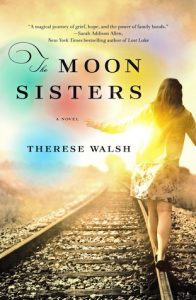 Their mother’s death sends Jazz and Olivia Moon on figurative and literal journeys of grief. Olivia, a synesthete with multiple sensory connections, sets off to see the ghost lights of the bog, an elusive dream of her mother’s for finishing her fantasy novel. Jazz grew up with a different mother, a colder mother, with misplaced expectations of being her sister’s keeper, this heightened sense of responsibility forcing her to “escort” Olivia on her quest. Secrets are exposed that rile and enlighten, urging them to look closer at each other, and determine what family means.
Their mother’s death sends Jazz and Olivia Moon on figurative and literal journeys of grief. Olivia, a synesthete with multiple sensory connections, sets off to see the ghost lights of the bog, an elusive dream of her mother’s for finishing her fantasy novel. Jazz grew up with a different mother, a colder mother, with misplaced expectations of being her sister’s keeper, this heightened sense of responsibility forcing her to “escort” Olivia on her quest. Secrets are exposed that rile and enlighten, urging them to look closer at each other, and determine what family means.
Walsh portrays a hidden trauma of a daughter, who passes on this pain to her own daughters, so well that dear reader readily sympathizes with all of the characters. Many real-life lessons are learned, on family, relationships, communication, expectations, and loss. This is a gorgeous story of living life differently, accepting others as they are, and being true to yourself. I was fortunate to receive this wonderful novel in an author giveaway, and I highly recommend it to fans of Heather Burch, Kristin Hannah, Diane Chamberlain, and Kerry Anne King.
The Secrets Between Us by Thritty Umrigar
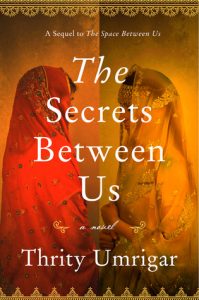 Bhima recovers and moves on after her friend Sera’s betrayal, though she cannot think evil of her, even if her granddaughter Maya holds Sera in contempt. The sequel to The Space Between Us follows Bhima in her struggle to keep her emotions and memories from derailing her plans to put Maya through college. Her new jobs open up opportunities for both of them, and expose Bhima to a new Mumbai. She ends up with partners in a new venture. Bhima is always evolving and accepting new paradigms in her desire to remain relevant in her granddaughters’ world. Umrigar brilliantly represents a woman who holds herself above the slum in which she lives, who believes if she hasn’t dignity, she has nothing, that circumstances do not define her. This next chapter in the life of an Indian woman whose life has unraveled delves deeply into the cultural mores of socioeconomic levels and the caste system, and the slowly shifting philosophies of those mores that question the caste system. Secrets come to light and Bhima goes with the flow. She truly is an extraordinary character, and a continuation of her story would be a joy. A trilogy would perfectly round it out (hint, hint Thritty). Readers of Lisa See, Isabel Allende, and Louise Farmer Smith will appreciate Umrigar’s work.
Bhima recovers and moves on after her friend Sera’s betrayal, though she cannot think evil of her, even if her granddaughter Maya holds Sera in contempt. The sequel to The Space Between Us follows Bhima in her struggle to keep her emotions and memories from derailing her plans to put Maya through college. Her new jobs open up opportunities for both of them, and expose Bhima to a new Mumbai. She ends up with partners in a new venture. Bhima is always evolving and accepting new paradigms in her desire to remain relevant in her granddaughters’ world. Umrigar brilliantly represents a woman who holds herself above the slum in which she lives, who believes if she hasn’t dignity, she has nothing, that circumstances do not define her. This next chapter in the life of an Indian woman whose life has unraveled delves deeply into the cultural mores of socioeconomic levels and the caste system, and the slowly shifting philosophies of those mores that question the caste system. Secrets come to light and Bhima goes with the flow. She truly is an extraordinary character, and a continuation of her story would be a joy. A trilogy would perfectly round it out (hint, hint Thritty). Readers of Lisa See, Isabel Allende, and Louise Farmer Smith will appreciate Umrigar’s work.
The Truth Waits by Susanna Beard
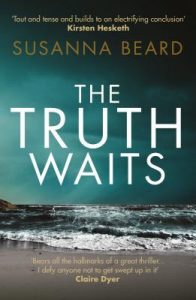 Anna finds a teenage girl’s body on the beach in Lithuania while on a business trip to her textile factory. Prevented from leaving by a natural disaster, she meets a journalist named Will, who moves into her carefully constructed life. He and her friends warn her against pursuing the girl’s murder, but her own past urges her on, until she finds herself in danger, and Will is incommunicado. Beard portrays a workaholic with repressed emotions and memories vividly, though Anna seems to throw up a lot and has quite a few anxiety attacks, not to mention the breakdown from grief. The story seems as self-oriented as Anna, focusing on her distress throughout, when it could have explored the horrors of sex trafficking further. Even as Anna is justified in her wavering faith in Will, his character is not developed enough for the reader to make a judgment call either way. Though the story is a good one, it could have given a little more weight toward other characters, and even considered location a main character in its cultural presence, but Anna simply comes across as too neurotic to notice anything else. I was graciously given a digital copy by the publisher through NetGalley.
Anna finds a teenage girl’s body on the beach in Lithuania while on a business trip to her textile factory. Prevented from leaving by a natural disaster, she meets a journalist named Will, who moves into her carefully constructed life. He and her friends warn her against pursuing the girl’s murder, but her own past urges her on, until she finds herself in danger, and Will is incommunicado. Beard portrays a workaholic with repressed emotions and memories vividly, though Anna seems to throw up a lot and has quite a few anxiety attacks, not to mention the breakdown from grief. The story seems as self-oriented as Anna, focusing on her distress throughout, when it could have explored the horrors of sex trafficking further. Even as Anna is justified in her wavering faith in Will, his character is not developed enough for the reader to make a judgment call either way. Though the story is a good one, it could have given a little more weight toward other characters, and even considered location a main character in its cultural presence, but Anna simply comes across as too neurotic to notice anything else. I was graciously given a digital copy by the publisher through NetGalley.
Love In Catalina Cove by Brenda Jackson—pub date October 30
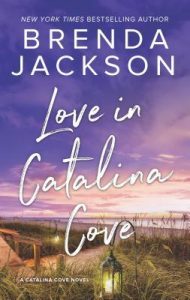 Vashti Alcindor inherits her aunt’s B&B in Catalina Cove, where she grew up, and where she ran away from over a decade ago. She wants to sell the business and put her hometown behind her for good. Enter the sexy, widowed sheriff. Then secrets come flying out of the past, changing Vashti in ways she would never have expected. The secrets are not so surprising, and some are a bit too coincidental, but in the end, a good story is hidden among the unnecessary repetition by multiple characters of Vashtis’ background and overly emoted revelations. A good beach read, a nice weekend romance read, Catalina Cove also shares a bit of Creole history, as it’s set on the coast of Louisiana, with a creole main character. I was graciously given an early copy by Harlequin through NetGalley.
Vashti Alcindor inherits her aunt’s B&B in Catalina Cove, where she grew up, and where she ran away from over a decade ago. She wants to sell the business and put her hometown behind her for good. Enter the sexy, widowed sheriff. Then secrets come flying out of the past, changing Vashti in ways she would never have expected. The secrets are not so surprising, and some are a bit too coincidental, but in the end, a good story is hidden among the unnecessary repetition by multiple characters of Vashtis’ background and overly emoted revelations. A good beach read, a nice weekend romance read, Catalina Cove also shares a bit of Creole history, as it’s set on the coast of Louisiana, with a creole main character. I was graciously given an early copy by Harlequin through NetGalley.
Flash Fiction Friday Guest Author I.V. Olokita
Israeli author I.V. Olokita has translated his flash fiction “Three Stories” so that I might share it on my blogblogblog. Enjoy! Look for an Artist Interview with this wonderful author soon!
Three Stories
I.V. Olokita
Three stories stand between you and the end of this day. Three more stories, and if everything goes according to plan, you’ll exit the elevator, enter your home within a step and a half, to your prince charming who is waiting for you at the same spot for the last eight years. You married him at the age of twenty and wanted to have a child right away, but this job, this important job, you got in a far-away city forced you to push back the decision to turn the passive into active by making the dream to have children come true. Meanwhile, he’s scratching his balls, and waits for you to come back from work every day, bearing baskets of money. You’re not angry with him, just disappointed in yourself that out of all the places in the world, you compromised for a house in the suburbs, and couldn’t convince him to move to the big city.

Stomping your feet, you think—Just three more stories and this awful day will be over. It’s not the work that’s killing you every day; it’s the drive, the long distances, and the long line for the elevator, especially during the summer. Sometimes you feel like you stew in your own juice. You know there are surveillance cameras everywhere, but it doesn’t bother you. If there’s an unpleasant smell, you’ll make sure that it’s not you, and even if there are zillions of other people at the elevator, you’ll still spray your cologne all over yourself peacefully. They can go fuck themselves; it’s definitely better than their stench.
You smile. Theoretically, the elevator’s screen shows that you’ve reached your story, and the door will open in a few seconds, you know that it’s the end now—you’ve finally arrived. So you smile. The door opens while exciting scripts are running through your mind of how you’ll enter your home, how he’ll run toward you and scoop your body into his arms. Maybe later he’ll take you to bed to make a dream of yours come true, or he’s prepared a romantic dinner to make it up to you for the awful day you had, although it wasn’t his fault. Your smile widens a little more, and your eyes are closing when the elevator door completes its divide for you. Taking one more step with your head bowed, you suddenly stop.

You’ve never loved any girl. In the locker rooms at school, you were always one of those who said “yuck,” but this woman that stands in front of you now—her smile does something completely different to you. For a moment, you can’t take your eyes off her, and you lower your gaze again. I wish I had such a lovely smile—you think to yourself, and fall in love with her even more. It all happens so quickly; she throws a shy “hello,” and enters the elevator in your place, and the door slides closed. You’re left there, standing alone, right at the entrance to your home, and you think if only you had the courage to shoot your hand into the closing gap between the doors and ride down the three stories with her.
But you don’t have that kind of courage. You just go home. He sits there in his briefs on the couch and doesn’t even mutter “hello” to you. The remainder of the shy smile you had is wiped off your face. You remember that during the last few years, there were countless smiles wiped off your pretty face. Once upon a time, it was different. Eight years ago you had an alluring smile, just like the woman from the elevator, and now all you have left are the scripts running through your mind during the three-story ride on the elevator. You think again about the smile of the woman and fall further in love with it, hoping you’ll meet her again tomorrow at one of the three stories on the elevator.

You don’t know, or maybe just don’t care, that this smile she wears, is the smile you lost a long time ago.
Bring Me Back by B.A. Paris—pub date June 19, 2018
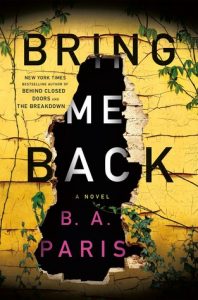 Finn told police the half-truth about Layla disappearing from a rest stop on their vacation in Fonches, France. More than a dozen years later, strange happenings at home in England make Finn believe that Layla is alive and upset that he is about to marry her sister. Paris leads the reader on a wild adventure, implicating culprits right and left, with Finn alternately dismissing suspicions and accusing friends aggressively. Hints of Layla show up in objects significant to her life and emails with information only she would know, causing Finn dreadful hope. The author brilliantly traverses through the landscape of a troubled mind, then reverts to a trope of spelling out the resolution in a lengthy letter, a bit disappointing after such magnificent writing. The resolution itself may astonish the most clever reader in its unique take on the concept. It’s a definite must read. I was fortunate to receive an ARC of this fantastic thriller from the publisher through NetGalley.
Finn told police the half-truth about Layla disappearing from a rest stop on their vacation in Fonches, France. More than a dozen years later, strange happenings at home in England make Finn believe that Layla is alive and upset that he is about to marry her sister. Paris leads the reader on a wild adventure, implicating culprits right and left, with Finn alternately dismissing suspicions and accusing friends aggressively. Hints of Layla show up in objects significant to her life and emails with information only she would know, causing Finn dreadful hope. The author brilliantly traverses through the landscape of a troubled mind, then reverts to a trope of spelling out the resolution in a lengthy letter, a bit disappointing after such magnificent writing. The resolution itself may astonish the most clever reader in its unique take on the concept. It’s a definite must read. I was fortunate to receive an ARC of this fantastic thriller from the publisher through NetGalley.